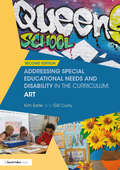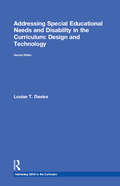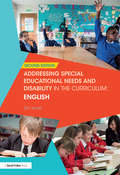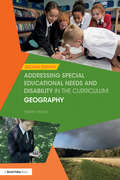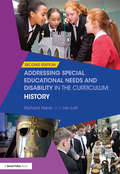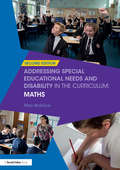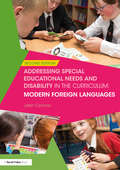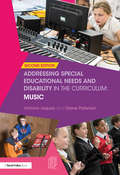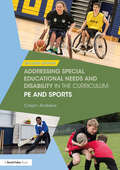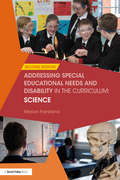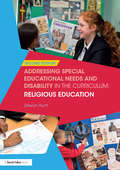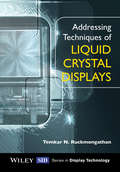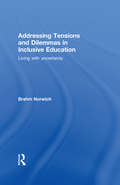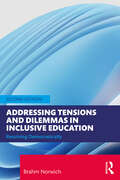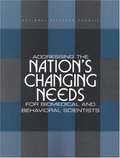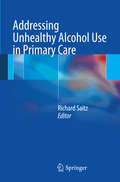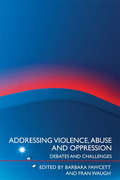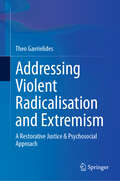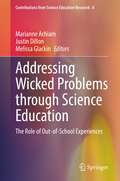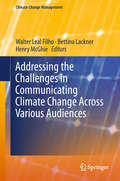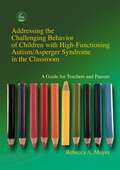- Table View
- List View
Addressing Special Educational Needs and Disability in the Curriculum: Art (Addressing SEND in the Curriculum)
by Kim Earle Gill CurryThe SEND Code of Practice (2015) reinforced the requirement that all teachers must meet the needs of all learners. This topical book provides practical, tried and tested strategies and resources that will support teachers in making art lessons accessible and interesting for all pupils, including those with special needs. The authors draw on a wealth of experience to share their understanding of special educational needs and disabilities and show how the art teacher can reduce or remove any barriers to learning. Offering strategies that are specific to the context of art teaching, this book will enable teachers to: develop students’ understanding, appreciation and enjoyment of art and design; advance students’ sense of enquiry about visual and tactile experiences; help pupils to realise their creative intentions, through the development of technical competence and manipulative skills; provide opportunities for personal and imaginative enquiry; sample a variety of art and design projects to use in their own lessons; plan the classroom layout and display to enhance learning; successfully train, and fully use the support of, their teaching assistants. An invaluable tool for continuing professional development, this text will be essential for secondary art teachers (and their teaching assistants) seeking guidance specific to teaching art to all pupils, regardless of their individual needs. The book will also be of interest to secondary SENCOs, senior management teams and ITT providers. Full of practical ideas and inspiration, and supported by free online resources, this is an essential tool for art teachers and teaching assistants and will help to deliver successful, inclusive lessons for all pupils.
Addressing Special Educational Needs and Disability in the Curriculum: Design And Technology (Addressing SEND in the Curriculum)
by Louise T. DaviesThe SEND Code of Practice (2015) reinforced the requirement that all teachers must meet the needs of all learners. This topical book provides practical, tried-and-tested strategies and resources that will support teachers in making design and technology lessons accessible and interesting for all pupils, including those with special educational needs. The author draws on a wealth of experience to share her understanding of special educational needs and disabilities and show how the design and technology teacher can reduce or remove any barriers to learning. Offering strategies that are specific to the context of design and technology teaching, this book will enable teachers to: better identify a student’s particular learning requirements; set inclusive design and making assignments which allow all students to participate and succeed; build students’ confidence in using a range of materials and tools; assist with design tasks where pupils take ownership of their work and learning; adapt the classroom environment to meet the needs of pupils; create a mutually supportive classroom which maximises learning opportunities. An invaluable tool for continuing professional development, this text will be essential for design and technology teachers (and their teaching assistants) seeking to include and motivate all pupils in their lessons, regardless of their individual needs. This book will also be of interest to secondary SENCOs, senior management teams and ITT providers. In addition to free online resources, a range of appendices provide design and technology teachers with a variety of pro forma and activity sheets to support effective teaching. This is an essential tool for design and technology teachers and teaching assistants, and will help to deliver successful, inclusive lessons for all pupils.
Addressing Special Educational Needs and Disability in the Curriculum: English (Addressing SEND in the Curriculum)
by Tim HurstThis book provides practical strategies and resources that have been proven effective in teaching English to pupils of all abilities, making English accessible, challenging and exciting. The author outlines important key principles that should underpin teaching and learning so that all pupils, including those with special educational needs, can enjoy the subject and make outstanding progress. The ideas and guidance draw on a wealth of experience, providing classroom activities and free online resources, which can be combined with different teaching approaches. A range of appendices provides teachers with real-life case studies and examples and templates for supporting pupils with SEND. Offering strategies that are specific to the context of English teaching, this book will enable teachers and their teaching assistants to: develop pupils’ understanding by engaging multi-sensory approaches; ensure all pupils are able to participate fully in lessons and achieve success; design and use individual plans for pupils with SEND; assess and adapt content and resources when differentiating materials for pupils with a wide range of learning needs; use formative assessments to measure learning and inform planning. An invaluable tool for whole-school continuing professional development, this fully revised text will be essential for teachers and their teaching assistants seeking guidance specific to teaching English to all pupils, regardless of their individual needs. This book will also be of interest to SENDCOs, learning support units and senior management teams as well as to teacher-training professionals.
Addressing Special Educational Needs and Disability in the Curriculum: Geography (Addressing SEND in the Curriculum)
by Helen HarrisThe SEND Code of Practice (2015) reinforced the requirement that all teachers must meet the needs of all learners. This topical book provides practical, tried and tested strategies and resources that will support teachers in making geography lessons accessible and interesting for all pupils, including those with special needs. The author draws on a wealth of experience to share her understanding of individual needs and show how the geography teacher can reduce or remove any barriers to learning. Offering strategies that are specific to the context of geography teaching, this book will enable teachers to: ensure all pupils are able to participate in every lesson; provide inclusive fieldwork opportunities that take into consideration the needs of all pupils; use formative assessments to measure learning and inform planning; plan the classroom layout and display to enhance learning; successfully use the support of their teaching assistants. An invaluable tool for continuing professional development, this text will be essential for middle school and secondary geography teachers (and their teaching assistants) who are committed to creating an inclusive learning environment for all pupils, regardless of their individual needs. The book will also be of interest to SENCOs and inclusion managers, curriculum co-ordinators, senior management teams and ITT providers. Full of practical ideas and inspiration, and supported by free online resources, this is an essential tool for geography teachers and teaching assistants who want to deliver successful, inclusive lessons for all pupils.
Addressing Special Educational Needs and Disability in the Curriculum: History (Addressing SEND in the Curriculum)
by Richard Harris Ian LuffThe SEND Code of Practice (2015) has reinforced the requirement that all teachers must meet the needs of all learners. This topical book provides practical, tried and tested strategies and resources that will support teachers in making history lessons accessible and exciting for all pupils, including those with special needs. The authors draw on a wealth of experience to share their understanding of special educational needs and disabilities and show how the history teacher can reduce or remove any barriers to learning. Offering strategies that are specific to the context of history teaching, this fully revised edition will enable teachers to: Make history education accessible and engaging to pupils of all abilities Create an inclusive classroom environment that responds to the emotional needs of the class and nurtures a culture of learning Develop inclusive practical demonstration and role play techniques to aid conceptual understanding Set assessment objectives Deploy in-class support effectively An invaluable tool for continuing professional development, this text will be essential for teachers (and their teaching assistants) seeking guidance specific to teaching history to all pupils, regardless of their individual needs. This book will also be of interest to SENDCOs, senior management teams and ITT providers. In addition to practical activities and supporting material contained in the book, there are also free online resources for readers to download and use in the preparation of successful, inclusive lessons for all pupils.
Addressing Special Educational Needs and Disability in the Curriculum: Maths (Addressing SEND in the Curriculum)
by Max WallaceThe SEND Code of Practice (2015) reinforced the requirement that all teachers must meet the needs of all learners. This topical book provides practical, tried and tested strategies and resources that will support teachers in making maths lessons accessible and interesting for all pupils, including those with special needs. The author draws on a wealth of experience to share his understanding of special educational needs and disabilities and show how the maths teacher can reduce or remove any barriers to learning. Offering strategies that are specific to the context of maths teaching, this book will enable teachers to: adopt a ‘problem solving’ approach to ensure students use and apply mathematics at all times during their learning develop students’ understanding of mathematical ideas structure lessons to empower and actively engage students create a mutually supportive classroom which maximises learning opportunities plan the classroom layout and display to enhance learning, for example displaying number lines, vocabulary lists and pupils’ work successfully train and fully use the support of their teaching assistants. An invaluable tool for continuing professional development, this text will be essential for secondary maths teachers (and their teaching assistants) seeking guidance specific to teaching maths to all pupils, regardless of their individual needs. This book will also be of interest to secondary SENCOs, senior management teams and ITT providers. In addition to free online resources, a range of appendices provide maths teachers with a variety of pro forma and activity sheets to support effective teaching. This is an essential tool for maths teachers and teaching assistants, and will help to deliver successful, inclusive lessons for all pupils.
Addressing Special Educational Needs and Disability in the Curriculum: Modern Foreign Languages (Addressing SEND in the Curriculum)
by John ConnorThe SEND Code of Practice has reinforced the requirement that all teachers must meet the needs of all learners. This book provides practical, tried and tested strategies and resources that will support teachers in making modern foreign languages accessible, challenging and exciting for all pupils, including those with special needs. The author draws on a wealth of experience to share his understanding of how SEND can affect learning and how the MFL teacher can reduce or remove any barriers to learning. Offering strategies that are specific to the context of MFL teaching, this book will enable teachers to: ensure all pupils are able to participate fully in every lesson; develop pupils’ understanding, motivation and enjoyment; adapt content and resources when differentiating materials for pupils with a wide range of learning needs; use formative assessments to measure learning. An invaluable tool for whole-school continuing professional development, this text will be essential for teachers (and their teaching assistants) seeking guidance specific to teaching languages to all pupils, regardless of their individual needs. This book will also be of interest to SENCOs, senior management teams and ITT providers.
Addressing Special Educational Needs and Disability in the Curriculum: Music (Addressing SEND in the Curriculum)
by Diane Paterson Victoria JaquissThe SEND Code of Practice (2015) has reinforced the requirement that all teachers must meet the needs of all learners. This topical book provides practical, tried and tested strategies and resources that will support teachers in making music lessons accessible and exciting for all pupils, including those with special needs. The authors draw on a wealth of experience to share their understanding of special educational needs and disabilities and show how the music teacher can reduce or remove any barriers to learning. Offering strategies that are specific to the context of music teaching, this book will enable teachers to: ensure all pupils are able to enjoy and appreciate music; find the appropriate musical instruments to suit the individual learner; develop approaches for teaching composition in mixed ability classrooms; provide opportunities for different types of performance; adapt content, approaches and resources for pupils with a wide range of learning needs. An invaluable tool for continuing professional development, this text will be essential for teachers (and their teaching assistants) seeking guidance specific to teaching music to all pupils, regardless of their individual needs. This book will also be of interest to SENCOs, senior management teams and ITT providers. In addition to free online resources, a range of appendices provides music teachers with lesson case studies, behaviour plans and guidance on behaviour management and effective teaching. This is an essential tool for music teachers and teaching assistants, and will help to deliver successful inclusive lessons for all pupils.
Addressing Special Educational Needs and Disability in the Curriculum: PE and Sports (Addressing SEND in the Curriculum)
by Crispin AndrewsThis topical book provides practical, tried and tested strategies and resources that will support teachers in making PE lessons accessible, rewarding and exciting for all pupils, including those with special needs. The author draws on a wealth of experience to share his understanding of special educational needs and disabilities and show how the PE teacher can reduce or remove any barriers to learning participation. Offering strategies that are specific to the context of PE and sports teaching, this book will enable teachers to: ensure all pupils are able to enjoy and appreciate the value of exercise and sport; create an inclusive environment; tailor activities to fit the needs of mixed ability groups; help pupils to develop the skills and confidence to enjoy different kinds of sport; encourage young people to think about what they are doing and make appropriate decisions for themselves. An invaluable tool for continuing professional development, this text will be essential for teachers, coaches and teaching assistants seeking guidance specific to teaching PE and sport to all pupils, regardless of their individual needs. This book will also be of interest to SENCOs, senior management teams and ITT providers. With free online material and practical resources in the appendices, this is an essential tool for everyone striving to engage all pupils in PE and sport.
Addressing Special Educational Needs and Disability in the Curriculum: Science (Addressing SEND in the Curriculum)
by Marion FranklandThe SEND Code of Practice (2015) reinforced the requirement that all teachers must meet the needs of all learners. This topical book provides practical, tried and tested strategies and resources that will support teachers in making science lessons accessible and exciting for all pupils, including those with special needs. The author draws on a wealth of experience to share her understanding of special educational needs and disabilities and show how science teachers can reduce or remove any barriers to learning. Offering strategies that are specific to the context of science teaching, this book will enable teachers to: help all students develop their ‘evidence-gathering’ skills and aid their scientific discovery by involving the use of all of the senses and structuring tasks appropriately; create a supportive environment that maximises learning opportunities; plan the classroom layout and display to enhance learning; use technology to adapt lessons to the needs of individual pupils; successfully train and fully use the support of their teaching assistants. An invaluable tool for continuing professional development, this text will be essential for teachers (and their teaching assistants) seeking guidance specific to teaching science to all pupils, regardless of their individual needs. This book will also be of interest to SENCOs, senior management teams and ITT providers. In addition to free online resources, a range of appendices provide science teachers with a variety of writing frames and activity sheets to support effective teaching. This is an essential tool for science teachers and teaching assistants, and will help to deliver successful, inclusive lessons for all pupils.
Addressing Special Educational Needs and Disability in the Curriculum: Second Edition (Addressing SEND in the Curriculum)
by Dilwyn HuntThe SEND Code of Practice (2015) reinforced the requirement that all teachers must meet the needs of all learners. This topical book provides practical, tried and tested strategies and resources that will support teachers in making RE lessons accessible and interesting for all pupils, including those with special needs. The author draws on a wealth of experience to share his understanding of special educational needs and disabilities and show how the RE teacher can reduce or remove any barriers to learning. Offering strategies that are specific to the context of RE teaching, this book will enable teachers to: create a supportive environment which maximises learning opportunities; plan the classroom layout and display to enhance learning; help students of all levels to gain confidence in their reading and writing ability; stimulate discussion and develop thinking skills through using stimuli such as religious art, music, artefacts and films; successfully train and fully use the support of their teaching assistants. An invaluable tool for continuing professional development, this text will be essential for teachers (and their teaching assistants) seeking guidance specific to teaching RE to all pupils, regardless of their individual needs. This book will also be of interest to SENCOs, senior management teams and ITT providers. In addition to free online resources, a range of appendices provide RE teachers with a variety of writing frames and activity sheets to support effective teaching. This is an essential tool for RE teachers and teaching assistants, and will help to deliver successful, inclusive lessons for all pupils.
Addressing Structural Racism, Bias, and Health Communication as Foundational Drivers of Obesity: Proceedings Of A Workshop Series
by Food and Nutrition Board National Academies of Sciences, Engineering, and Medicine Health and Medicine Division Roundtable on Obesity SolutionsThe National Academies of Sciences, Engineering, and Medicine's Roundtable on Obesity Solutions convened a three-part workshop series that explored how structural racism, weight bias and stigma, and health communication intersect with obesity, gaps in the evidence base, and challenges and opportunities for long-term, systems-wide strategies needed to reduce the incidence and prevalence of obesity. Through diverse examples across different levels and sectors of society, the workshops explored how to leverage the connections between these three drivers and innovative data-driven and policy approaches to inform actionable priorities for individuals, organizations, and policymakers to make lasting systems change.
Addressing Techniques of Liquid Crystal Displays
by Temkar N. RuckmongathanUnique reference source that can be used from the beginning to end of a design project to aid choosing an appropriate LCD addressing technique for a given application This book will be aimed at design engineers who are likely to embed LCD drivers and controllers in many systems including systems on chip. Such designers face the challenge of making the right choice of an addressing technique that will serve them with best performance at minimal cost and complexity. Readers will be able to learn about various methods available for driving matrix LCDs and the comparisons at the end of each chapter will aid readers to make an informed design choice. The book will address the various driving techniques related to LCDs. Due to the non-linear response of the liquid crystal to external voltages, different driving methods such as passive and active matrix driving can be utilized. The associated theoretical basis of these driving techniques is introduced, and this theoretical analysis is supplemented by information on the implementation of drivers and controllers to link the theory to practice. Written by an experienced research scientist with over 30 years in R&D in this field. Acts as an exhaustive review and comparison of techniques developed for passive-matrix addressing of twisted nematic and super-twisted nematic (STN) LCDs. Discusses the trend towards "High Definition" displays and that a hybrid approach to drive matrix LCDs (combination of active and passive matrix addressing) will be the future of LCD addressing. Contains the author's recent work on Bit-Slice Addressing that is useful for fast responding LCDs, as well as a chapter on driving ferroelectric LCDs Provides an objective comparison that will enable designers to make an informed choice of an addressing technique for a specific application. Includes examples of the practical applications of addressing techniques. Organised in a way that each chapter can be read independently; with the basic knowledge and historical background gained from the introductory chapters, adequate for understanding the techniques that are presented in the remaining chapters making it a self-contained reference.
Addressing Tensions and Dilemmas in Inclusive Education: Living with uncertainty
by Brahm NorwichBased on extensive research, Addressing Tensions and Dilemmas in Inclusive Education presents a contemporary and critical analysis of the interaction between different perspectives and positions in the field of inclusive education. Referring to existing attitudes on the education of children and young people with learning difficulties and disabilities, Professor Norwich argues that despite the appeal of inclusion as a single powerful position, its practical realisation involves tensions and dilemmas that have to be addressed and resolved. This core analysis is illustrated by a review of relevant national and international concepts, principles, research and practices drawing on literature in areas of current interest and concern, such as: identification and classification; current national and international conceptions; pedagogic and curriculum issues; organisation of schooling; parental and student perspectives; the contribution of research to policy and practice. Engaging with the fundamental issues in the field and providing a coherent perspective that recognises and justifies the inter-connection between specialised and general school provision, this accessible and timely book will be of interest to all researchers and students of inclusive education.
Addressing Tensions and Dilemmas in Inclusive Education: Resolving Democratically
by Brahm NorwichThis updated second edition of Addressing Tensions and Dilemmas in Inclusive Education further develops the critical analysis of the initial edition that integrates the interaction between different perspectives and positions in the field of inclusive education. This key resource expands the arguments present in the first edition with clearer implications about how to address tensions and dilemmas in inclusive education, and resolve them through democratic deliberation. Based on contemporary research, theory and policy, as well as responding to current perspectives towards the education of children and young people with learning difficulties and disabilities, Brahm Norwich extends and refines the original core argument of the previous edition – the practical realisation of inclusion involves tensions and dilemmas that have to be addressed and resolved. This core analysis focuses on:- identification and classification- current national and international conceptions- pedagogic and curriculum issues- organisation of schooling- parental and student perspectives and the contribution of research to policy and practice.Re-engaging with the fundamental issues in the field and providing a coherent perspective that recognises and justifies the inter-connection between specialised and general school provision, this accessible new edition will be of interest to all students and researchers of inclusive education.
Addressing The Nation's Changing Needs For Biomedical And Behavioral Scientists
by National Research CouncilAs biomedical and behavioral research progresses into new areas, the number of scientists active in various fields rises and falls, and the health needs of the U.S. population evolve, it is important to ensure that the preparation of future investigators reflects these changes. This book addresses these topics by considering questions such as the following: What is the current supply of biomedical and behavioral scientists? How is future demand for scientists likely to be affected by factors such as advances in research, trends in the employment of scientists, future research funding, and changes in health care delivery? What are the best ways to prepare prospective investigators to meet future needs in scientific research?In the course of addressing these questions, this volume examines the number of investigators trained every year, patterns of hiring by universities and industry, and the age of the scientific workforce in different fields, and makes recommendations for the number of scientists that should be trained in the years ahead.This book also considers the diversity of the research workforce and the importance of providing prospective scientists with the skills to successfully collaborate with investigators in related fields, and offers suggestions for how government and universities should structure their research training programs differently in the future.
Addressing Treatment Resistance in the Development of Cancer Immune Modulator Therapeutics: Proceedings Of A Workshop
by Board on Health Care Services Forum on Drug Discovery, Development, and Translation Board on Health Sciences Policy National Cancer Policy Forum National Academies of Sciences, Engineering, and Medicine Health and Medicine DivisionThe use of immune modulator therapeutics, a type of immunotherapy enhancing the body immune system response to cancer, was perceived as the beginning of a new era in cancer care. While still important and frequently used, some of these therapeutics produce uneven response rates, disease resistance, and serious side effects. The National Academies National Cancer Policy Forum, in collaboration with the Forum on Drug Discovery, Development, and Translation, hosted a public workshop to discuss challenges related to immunotherapy treatment resistance, as well as potential policy opportunities to improve the development of immunotherapies for cancer treatment.
Addressing Unhealthy Alcohol Use in Primary Care
by Richard SaitzWhile there is a wealth of published information on addiction medicine, the psychological aspects of alcohol abuse, and behavioral medicine with regard to addiction, virtually none of these resources were written with the primary care provider in mind. Addressing Unhealthy Alcohol Use in Primary Care is a resource for primary care clinicians who are confronted by patients with these problems daily, and who wish to successfully address these issues in their practice. It would focus on the literature and science relevant to primary care practice and cover the range of interventions appropriate for this setting. Topics include assessment, brief counseling interventions, pharmacotherapy, referrals to both specialty care and Alcoholics Anonymous (and other self-help programs), psychiatric co-morbidity and other drug use, and other information specific to the needs of the primary care provider.
Addressing Violence, Abuse and Oppression: Debates and Challenges
by Barbara Fawcett Fran WaughEveryone working in health and social care is at one point or another confronted by violent behaviour and its consequences. Addressing Violence, Abuse and Oppression provides a broad overview of violence in relation to a range of groups and areas that involve human service professionals. Adopting an international perspective, this book looks at the ways in which violence, abuse and oppression can be clearly associated with power imbalances which are often gendered and which are covertly or overtly manifested at a range of levels including the interpersonal as well as the organizational and the political. It explores debates and challenges with regard to theoretical orientations, policy frameworks and how power imbalances intersect with a range of influencing factors including gender, poverty, indigenous/ethnic issues, class and sexuality. Examining the implications for human service professionals, each chapter of Addressing Violence, Abuse and Oppression provides an historical overview, explores theoretical perspectives, examines specific policy and practice context, appraises the contribution from research and assesses the impact for individuals and groups.
Addressing Violent Radicalisation and Extremism: A Restorative Justice & Psychosocial Approach
by Theo GavrielidesThis book adopts an interdisciplinary approach to confront one of the most urgent global challenges of our time violent radicalisation and extremism. It critically examines how restorative justice, positive criminology, and positive psychology intersect to address the behaviors and social conditions that foster extremism, offering a framework that reflects the complexities of our era. Grounded in a synthesis of philosophical inquiry, normative analysis, and empirical evidence from six international pilot projects conducted between 2017 and 2024, the volume navigates the shifting boundaries between punitive and preventive approaches. It explores the potential of community-based initiatives to foster understanding, empathy, and empowerment as means to reduce violence and promote reconciliation. Through a focus on the psychological and social roots of extremism, the book delves into the restorative capacity of justice systems to mend fractured communities and the role of positive psychological interventions in reshaping harmful behaviors. In doing so, it bridges theoretical advancements with actionable strategies for policymakers, practitioners, and researchers seeking alternatives to traditional punitive models. This collection reflects the depth and breadth of contemporary scholarship in counter-extremism, offering perspectives from established experts and emerging voices. It serves as a vital resource for those engaged in fields such as social work, human rights, conflict resolution, and criminology, contributing fresh insights and practical tools to prevent and mitigate radicalisation. &“This book offers a refreshing and holistic perspective on one of the most pressing global issues today violent extremism. By integrating restorative justice principles with a psychosocial approach, the book moves beyond punitive measures and focuses on healing, rehabilitation, and the reintegration of individuals into society. This book is a thought-provoking and important contribution to the discourse on counter-extremism&”.<span lang="EN-GB" style="font-size: 12.0pt; font-family: 'Times New Roman',serif; mso-fare
Addressing Wicked Problems through Science Education: The Role of Out-of-School Experiences (Contributions from Science Education Research #8)
by Justin Dillon Marianne Achiam Melissa GlackinThis book discusses a number of ways in which out-of-school science education can uniquely engage learners with ‘wicked’ global problems such as biodiversity loss and climate change. The idea for the volume originated in discussions among members of the ESERA special interest group on "Science Education in Out-of-School contexts". It emerged from these discussions that out-of-school institutions and experiences offer opportunities for critical engagement in wicked problems that go far beyond what is possible solely in the science classroom.The book opens with a principled discussion of the nature of wicked problems and what addressing them involves. This introduction clarifies key terms and ideas to create a coherent backdrop for the rest of the book. Subsequent chapters discuss the challenges of designing educational experiences to address wicked problems, as well as the teaching and learning that takes place. The authors offer perspectives across a range of out-of-school environments such as science centres, natural history museums, botanical gardens, geological sites, and local communities. The book concludes with a chapter that synthesises the findings from the various contributions and points to the messages for educators. Finally, the editors outline an exciting research agenda to build knowledge of education addressing wicked problems. The intended audience of the book includes teachers, educators/facilitators, teacher educators, curriculum developers, and early career researchers as well as established researchers.
Addressing Workforce Challenges Across the Behavioral Health Continuum of Care: Proceedings of a Workshop
by Board on Health Care Services National Academies of Sciences, Engineering, and Medicine Health and Medicine Division Forum on Mental Health and Substance Use DisordersIn July 2024, the National Academies Forum on Mental Health and Substance Use Disorders hosted a public workshop to address the workforce needs and challenges across the behavioral health continuum. Experts shared insights on improving infrastructure to enhance access and quality of mental health services with a focus on advancing health equity. Discussions highlighted structural and policy challenges, care integration, and the potential role of technology and innovation to tackle workforce shortages. This proceedings highlights the presentations and discussions that occurred at the workshop.
Addressing the Adverse Consequences of Cancer Treatment: Proceedings Of A Workshop
by Board on Health Care Services Margie Patlak National Cancer Policy Forum Forum on Aging, Disability, and Independence Sharyl Nass National Academies of Sciences, Engineering, and Medicine Health and Medicine Division Francis AmankwahCancer treatment can lead to an array of significant short- and long-term physical, psychosocial, and socioeconomic consequences for patients and their families. To examine the opportunities to prevent and mitigate the adverse effects of cancer treatment, the National Academies of Sciences, Engineering, and Medicine hosted a virtual workshop, Addressing the Adverse Consequences of Cancer Treatment, in November 2020. This workshop was convened by the Academies' National Cancer Policy Forum in collaboration with the Forum on Aging, Disability, and Independence. Workshop presentations and discussions described the range of adverse effects that patients with cancer may experience across the life course, and highlighted potential strategies to improve quality of life for cancer survivors and their families.
Addressing the Challenges in Communicating Climate Change Across Various Audiences (Climate Change Management)
by Walter Leal Filho Henry McGhie Bettina LacknerThis book offers a concrete contribution towards a better understanding of climate change communication. It ultimately helps to catalyse the sort of cross-sectoral action needed to address the phenomenon of climate change and its many consequences. There is a perceived need to foster a better understanding of what climate change is, and to identify approaches, processes, methods and tools which may help to better communicate it. There is also a need for successful examples showing how communication can take place across society and stakeholders. Addressing the challenges in communicating to various audiences and providing a platform for reflections, it showcases lessons learnt from research, field projects and best practices in various settings in various different countries. The acquired knowledge can be adapted and applied to other situations.
Addressing the Challenging Behavior of Children with High-Functioning Autism/Asperger Syndrome in the Classroom: A Guide for Teachers and Parents
by Rebecca MoyesHow do teachers and parents of children with autism address a child's social skills? And what do they do about problem behaviors? This book provides possible explanations for these behaviours, and a wealth of practical help for both teachers and parents to address them. Teachers learn how to create environmental supports and how to incorporate specific teaching strategies. Students with autism learn the new skills they might need, and ways of making their behavior more acceptable. This book is full of practical tips on how to tackle different kinds of challenging behaviors both in the classroom and outside it.
